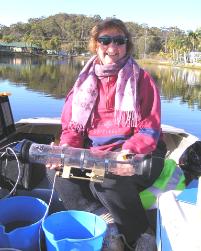Tweed suits research into microscopic menaces
Published on 30 August, 2007
CQU student Sally Everson is excited about the early findings of her Masters of Applied Science degree.
Sally conducts her studies in the Tweed Catchment on the Queensland/NSW border, where she has been sampling several lakes and reservoirs for almost a year.

The research involves measuring and recording details of blue-green algal and bacterial populations, together with a range of physical and chemical water quality data.
The algal populations have been particularly interesting, with 2 known toxin-producing species (Aphanizomenon ovalisporum and Cylindrospermopsis raciborskii) appearing in the water column.
The toxin produced by these species of algae can be harmful to plants, animals and humans, which means that Sally's research will be critically important to the ongoing management of affected reservoirs.
"The research to date is exciting as it is revealing unexpected and previously unknown trends in the field data which require understanding and explanations - I feel like a detective on a hunt!" Sally says.
"By trying to understand why and how things happen - in nature this can be very unpredictable - I need a lot of reading and absorbing of knowledge from previous work and I'm trying to find links. It's a continuous learning curve.
"I've been sharing knowledge with current experts in this field - their willingness to help and advise is fabulous!
"Unfortunately, the more you uncover, the more questions are raised! This leads to time constraints - it is not possible to follow all leads that are revealed. Financial constraints are also difficult - some analysis is costly and hence decisions must be made as to how many and which samples will take priority.
"Another downside is winter sampling - having to launch the boat over grass covered in ice and with the surrounding homes with ice on their rooves. Minus 3 degrees on the water! - however, the algae still grew!"
Sally says that there are also challenges with being a part-time external student.
"Being a long way from the University can give a feeling of isolation but this is alleviated by having access to the University website and the on-line Library services and databases for research. Availability of staff and services on line in all areas is excellent," she says.
"Orientation helped a lot to put faces to names, particularly in the management side of the process. It showed distance students what facilities were available and how to access them. Most questions can be handled easily by either email or phone.
"Support and encouragement of my CQU supervisors is proving to be very successful and very important. This is more so from my perspective as a mature-aged student, needing also to update to the electronic age in both research and analysis."
Sally is supervised by Dr Larelle Fabbro and Dr Susan Kinnear (both of CQU) and Paul Wright (of Tweed Laboratory Centre).
The Tweed Shire Council and Tweed Laboratory Centre are supporting Sally's research by providing laboratory resources and testing equipment and instrumentation as well as allowing her time to conduct field sampling and analysis.
Sally aims to continue research and study of toxic cyanobacteria (in particular, Aphanizomenon ovalisporum and Cylindrospermopsis raciborskii), and to gain a better understanding of how and why blooms occur and the ramifications of such blooms.
"This will enable us to better manage water bodies affected by these troublesome microscopic bacteria and lead to improved water management, from ecological and economical viewpoints as well as for both human and animal health," she says.
Sally is also investigating the possibility of collaborating with other algal researchers in South Australia to use genetics analyses to find out more about the algae and how and why toxin is produced.
Sally lives in Tweed Heads and works for Tweed Laboratories.

